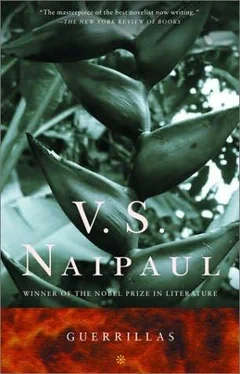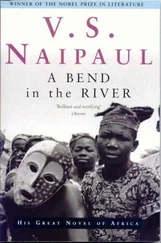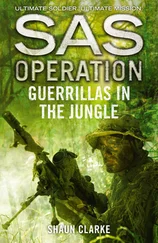V. Naipaul - Guerrillas
Здесь есть возможность читать онлайн «V. Naipaul - Guerrillas» весь текст электронной книги совершенно бесплатно (целиком полную версию без сокращений). В некоторых случаях можно слушать аудио, скачать через торрент в формате fb2 и присутствует краткое содержание. Год выпуска: 1990, ISBN: 1990, Издательство: Vintage, Жанр: Современная проза, на английском языке. Описание произведения, (предисловие) а так же отзывы посетителей доступны на портале библиотеки ЛибКат.
- Название:Guerrillas
- Автор:
- Издательство:Vintage
- Жанр:
- Год:1990
- ISBN:978-0679731740
- Рейтинг книги:5 / 5. Голосов: 1
-
Избранное:Добавить в избранное
- Отзывы:
-
Ваша оценка:
- 100
- 1
- 2
- 3
- 4
- 5
Guerrillas: краткое содержание, описание и аннотация
Предлагаем к чтению аннотацию, описание, краткое содержание или предисловие (зависит от того, что написал сам автор книги «Guerrillas»). Если вы не нашли необходимую информацию о книге — напишите в комментариях, мы постараемся отыскать её.
Guerrillas — читать онлайн бесплатно полную книгу (весь текст) целиком
Ниже представлен текст книги, разбитый по страницам. Система сохранения места последней прочитанной страницы, позволяет с удобством читать онлайн бесплатно книгу «Guerrillas», без необходимости каждый раз заново искать на чём Вы остановились. Поставьте закладку, и сможете в любой момент перейти на страницу, на которой закончили чтение.
Интервал:
Закладка:
Jimmy stood up. He slapped his hand hard on his right trouser pocket and said, “Mannie!”
Mannie stood up. The corners of his eyes were red.
“I lose my pen, Mannie.”
“Mr. Ahmed.”
“My red biro. Yellow with a red cap. I think I drop it outside somewhere. I don’t want to lose it. Go and look for it for me.”
Mannie came out into the aisle. He hesitated there. He looked at the bright front door. Then he began to walk slowly toward Jimmy, Bryant, and the back door.
Jimmy said, “Go and look by the septic tank.”
Mannie walked daintily in his tight shoes, his buttocks high and hard in his tight trousers, his loosened handkerchief bulging in his hip pocket, with one corner hanging out.
Jimmy said, “I don’t want to lose that pen, Mannie.”
Jimmy sat on another bed. Bryant remained standing in the doorway.
After some time they heard light steps. They saw Mannie. As soon as he saw them he stopped, about five or six feet away from the back door. There was dust in his hair; his blue shirt was dark with sweat around the collar and below the arms; dust discolored his trousers from the knees down.
Jimmy said, “Mannie.”
“Sorry, Mr. Ahmed.”
“You didn’t see anything?”
“No, Mr. Ahmed.”
Jimmy said, “Lie down, Bryant. Take a rest. Come in, nuh, Mannie.”
Mannie came in, his sweated face tight, his eyes burning, his walk still dainty.
Jimmy said, “But you spoil all your pretty clothes, Mannie.”
Mannie didn’t seem to hear. He went to his bed and, not dusting his hair or trousers or hands, sat on the mattress. He looked down at the concrete floor and his eyes began to water.
Jimmy said, “We’re all tired. We all have to rest. But what about you, Mannie? Where you going to go? No food here now. The Grange is closed.”
Mannie, his eyes still watering, didn’t turn.
Bryant got up from the bed nearest the back door. He said, “Somebody coming.”
Jimmy, going to the wall and tiptoeing to look through the louvers, saw the car far away on the road, beyond the last cleared field. There was dazzle on the bonnet, but the windscreen was in shadow and the driver could not be seen.
Jimmy said, “Lie down, Bryant. Save your strength. Mannie, I’m going to clean up.”
He went out through the back door. Bryant put his cutlass on the concrete floor between the wall and his bed and lay down flat on the bare mattress. The coconut-fiber filling bristled through the ticking. Bryant looked up at the corrugated-iron roof, so new still, with the cockerel emblem and the name of the manufacturers, far away in Canada, stenciled in blue.
The car came nearer. It stopped; a door banged. A disturbance of dirt clods and pebbles, and Roche appeared, with his short-sleeved white shirt, his light-colored khaki trousers narrow around his flat waist, and his dark glasses. He came into the building, took off the glasses and put the end of one temple in his mouth. His face was drawn and he looked impatient. He saw the tears in Mannie’s eyes.
He said, “Mannie.”
Mannie didn’t look up. He said, “Mr. Ahmed gone to wash his face.”
“You’ve been working?”
Mannie didn’t reply. And Roche, waiting, considered the table with the junked office equipment, the dusty stalled standard typewriter, the rusting duplicator; the timetable on the wall, the newspaper pinups above the beds; the Jimmy Ahmed poster with the crude portrait of Jimmy, all hair and mustache: I’m Nobody’s Slave or Stallion, I’m a Warrior and Torch Bearer . The concrete floor was dusty; the iron beds were stripped; and the bare mattresses gave off a smell of coconut fiber. Roche saw that the bed at the far end of the room was occupied.
He said, “Bryant.”
Bryant didn’t reply.
Jimmy appeared in the doorway. He was bare-chested, and his face was blank, the eyes assessing, his mustache masking his mouth.
He said, “Massa. We were giving you up. A tour of inspection? You’re still inspecting?”
Roche said, “You all seem to be in a state.”
“We’ve been working. Life has to go on. Bryant will take you out and show you. Mannie too.”
Bryant rose and sat on the edge of his bed, facing the wall.
Jimmy came down between the beds and stood a few feet away from Roche.
Jimmy said, “Mannie has come back, massa.”
Mannie half raised himself off the mattress and took out his handkerchief from his hip pocket.
Roche said, “Did Donaldson come?”
“We don’t have anything to do with Donaldson. All that’s gone with the wind.”
Jimmy’s chest, paler than his face and forearms, was moist with perspiration. Stiff little coils of hair, unexpectedly Negroid, were scattered between his purple-brown nipples, which were as large as a woman’s.
Roche sucked on the end of the temple of his dark glasses. He said, “Didn’t he come to see you about the tractor?”
“To take it back, you mean?”
“I don’t know about that. He didn’t come?”
“If he came we didn’t see him. We’ve been busy all afternoon. Bryant will show you.”
“Nobody came?”
“We didn’t see anybody.”
Roche looked at Mannie. Mannie’s eyes were still wet and he was still looking down. His loosened handkerchief, unused, remained in his right hand. In that same hand he was holding a cylindrical blue lighter and, absently, he was polishing the bronze-colored metal at the top with his thumb. Roche hesitated. He thought: Sahara gas. In his hesitation his eyes caught Jimmy’s — surprise there, and for an instant something like an appeal. And almost at the same time he saw Bryant standing at the far end of the room, looking at him.
Roche took the temple of his glasses out of his mouth and, swinging the glasses between his thumb and forefinger, took a half-step toward Mannie’s bed. Then he stopped and turned and, slowly, looking at the beds, mattresses, and the posters on the wall, he walked toward the bright door. He said, “Everybody at the office knows I’m here. I’m sure they told Donaldson. A wasted journey.” He was in the sunlight. He put on his glasses and said, “But never mind,” and stepped from the concrete floor onto the dry red earth.
And he was walking away — the land graded down to clay, baked hard, dusty on the surface — when he heard Jimmy call, but uncertainly, “Massa.”
He kept on walking.
He thought: This place has become a slaughterground. The words seemed, to have been given to him, and he thought: I’ve just done the bravest thing in my life. He concentrated on Jimmy and addressed him mentally: You wouldn’t do anything to me. You wouldn’t dare.
He came to the dry ditch and the bridge of tree trunks and packed earth. He got into the car. He didn’t look at the land he had just traversed or the building he had just left. He thought: If you try anything now, I’ll kill you.
He turned in the road — two movements, and still no one called out to him — and then he was driving into the sun, past the field with the broken-down tractor standing against the wall of bush, past the dry flattened ridges and the furrows choked with bright green weeds, past the blocks of old bush, the spiky wild palms, the red-and-black-striped barrier pointing at the sky, the Sablich’s sign, still new, announcing Thrushcross Grange, past the ruins of the abandoned industrial park, the overgrown pillars still standing in rows, the flat paved areas cracked open by grass and wild young trees, rusty reinforcing metal showing here and there through broken concrete.
And then he was on the highway, locked in the afternoon traffic, and he was being taken past all the stations of that familiar drive. The sun, already yellowing, picked out all the ridges and dips of the scorched hills, which smoked. Far away in the brown fields people were cutting grass. The junked cars beside the road; the country settlements; the burning rubbish dump, trucks and people amid the smoke and the miniature hills of confetti-like refuse, the big-breasted black corbeaux squatting on the fence posts or hopping about on the ground; the shantytown resettlements, their population spilling out of rows of identical tin-and-concrete huts, back to back and face to face down long red avenues that seemed regularly to open and close as he drove past; the bauxite pall; the hot, squalling afternoon city, melting tar, honking buses and taxis and enraged, sweating cyclists.
Читать дальшеИнтервал:
Закладка:
Похожие книги на «Guerrillas»
Представляем Вашему вниманию похожие книги на «Guerrillas» списком для выбора. Мы отобрали схожую по названию и смыслу литературу в надежде предоставить читателям больше вариантов отыскать новые, интересные, ещё непрочитанные произведения.
Обсуждение, отзывы о книге «Guerrillas» и просто собственные мнения читателей. Оставьте ваши комментарии, напишите, что Вы думаете о произведении, его смысле или главных героях. Укажите что конкретно понравилось, а что нет, и почему Вы так считаете.












